
Bachelor in Communication and Digital Media
- Home
- Studies
- Undergraduate Degrees
- Bachelor In Communication And Digital Media
A unique Bachelor in Communication and Digital Media
The study plan for the Bachelor in Communication and Digital Media at IE University is designed and delivered by great academic minds and leading sector practitioners. Itleverages our outstanding faculty’s expert knowledge, original research and the linkages between our university and the professional world.
The Bachelor in Communication and Digital Media aims to help young, ambitious individuals build the proper skill set to become professionals capable of facing real-world challenges.
Our hands-on teaching methodology guarantees that Bachelor in Communication and Digital Media students strike the perfect balance between classroom learning and practical projects based on real-world scenarios.
Through this holistic approach, our students develop professional profiles that can adapt to the evolving landscape, staying one step ahead of emerging trends and technologies in the digital media world.

BACHELOR IN COMMUNICATION AND DIGITAL MEDIA STUDY PLAN
Learn more about our Bachelor of Communication and Digital Media
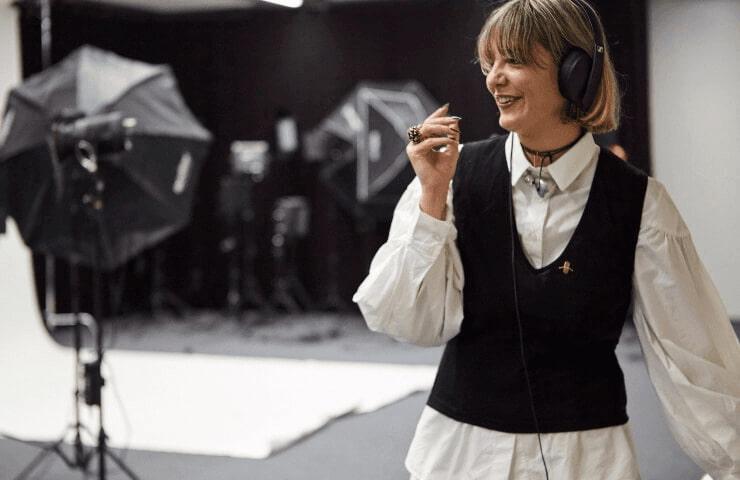
FIRST YEAR
Welcome to your first year! Here, you’ll acquire the basic tools you will use throughout your career to enhance brand communication. It is your introduction to the creative processes, research skills, basic management literacy, and visual, audiovisual and writing competencies that you will refine further and apply in years two, three and four.
In the first semester, you will be exposed to Communication Foundations and theory, Writing for Media and the wider world of Globalization and Cross-Cultural Communication. Other courses this semester include Photography, Writing Skills and Graphic Design and Infographics.
The second semester is when you’ll develop more creativity tools in Video Production and explore more theory in Public Opinion/Persuasion and Representation, Media Culture & Ethics in the Digital Era. You’ll also learn Research Techniques to laterally understand consumers and their choices. There are further mandatory courses in Excel, as well as courses in Management Literacy and the Humanities.

SECOND YEAR
In year two, you will start building upon what you’ve already learned in the first year. As you continue to master these essential skills, you’ll also acquire new knowledge and competencies that are vital in modern communication and media.
The first semester features courses in Visual Storytelling and Web and App design. Apart from that, you’ll begin to explore the corporate world through Corporate Communication and Communication Law, and build Quantitative Research skills that will be crucial to understanding what consumers and audiences want.
In the second semester, you will dive deep into the Media and Entertainment Industries while completing courses in Digital Marketing and Social Media. Additionally, you’ll delve into the fascinating world of Public Relations and discover an array of Qualitative Research Methods to enhance your quantitative skills. You will also have the opportunity to rub elbows with students from other programs through transversal courses in Technology and Entrepreneurship.

THIRD YEAR
In the third year, you’ll add the most advanced tools and specialized expertise to your skill set. This is where you will begin to fully apply everything you’ve learned in the preceding two years of the program.
The first semester features Media Relations and Media Training, complemented by courses in Consumer Behavior, Branding Reputation and Integrated Communication Strategies. Others include the Innovation Lab, where you’ll discover creative research methodologies to help you unleash your creativity. Meanwhile, IE IMPACT offers the option to develop multidisciplinary leadership skills in a transversal setting.
The second semester will look a little different. Here, you’ll get a chance to personalize your academic journey by pursuing electives that best align with your professional ambitions. Through our International Mobility office, we have agreements with more than 160 top institutions in 50 countries all over the world, allowing you to study your preferred elective course either at IE University or during an exchange semester abroad.
Alternatively, you could opt to take on a full-time internship instead, acquiring professional experience and applying what you’ve learned in a real-world setting.
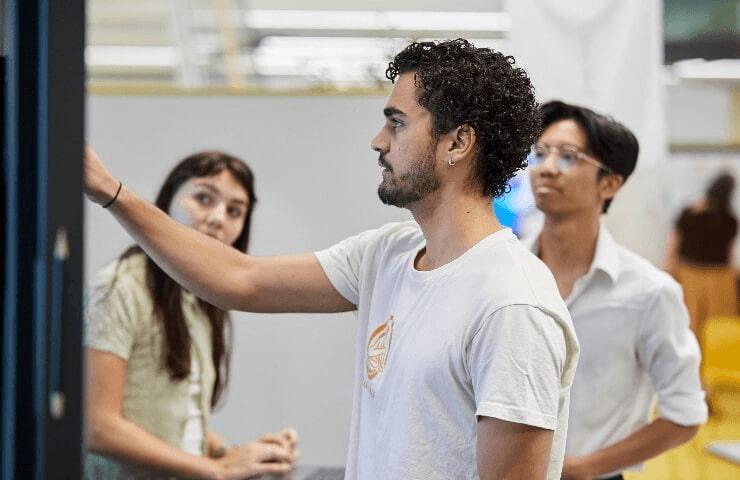
FOURTH YEAR
The fourth and final year prepares you to enter the professional arena. In the first semester, you will study various courses including Advertising Management and Media Planning. In Creative Project Management (Part One, Research and Development), you will start working on a consultancy project with a real-life client, catering to their specific communication needs and strategy.
You’ll also have the opportunity to choose from one of two concentrations: Corporate Communication or Creative Content.
In the second semester, you will continue with Part Two of the Creative Project Management course, where you’ll produce and deliver the products you already identified and developed in the first part of the course. You’ll also explore the fascinating world of Political Communication and Advocacy Campaigns and, to top it off, become familiar with the latest artificial intelligence tools and their application in the professional world in the course, AI as a Professional Tool.
The program culminates with your capstone project. Here, you’ll put everything you’ve learned throughout the last four years into practice as you execute a personal project in your area of interest. Such projects can be creative, ranging from brand book development to advertising campaigns and documentary filmmaking; or they can be more corporate-minded, related to communication and brand positioning. Either way, your capstone project is the perfect opportunity to undertake an academic research project on a topic that fascinates you and positions you for future success.
Bachelor in Communication and Digital Media Concentrations
The Bachelor in Communication and Digital Media has developed two concentrations in response to the evolving needs of top employers and recruiters in the sector. Each concentration provides an opportunity to deepen your knowledge, skills and practical experience in your area of professional interest.
We offer concentrations in two distinct, high-demand areas: Corporate Communication and Creative Content.

CORPORATE COMMUNICATION
The Corporate Communication concentration takes you on a deeper dive into the world of marketing strategy and management. With a sharp business focus, it imparts the essential tools brands and companies utilize to maximize their impact. Courses include Team Leadership and Decision-making, Corporate Social Responsibility, Marketing Strategy, Sustainable Branding and Influencer Marketing, among others.
IS FOR STUDENTS WHO ARE…
passionate about strategy, management, market research and positioning. You’re looking to apply your natural creative talent to devise strategies that position brands optimally, while leveraging harder skills such as research and analytics to inform your creativity.
LOOKING FOR…
the skills and knowledge to penetrate and engage a saturated market, that will add value to your own profile and to your organization. You’re seeking a holistic program that combines essential business competencies like budgeting and forecasting with the strategic and creative skills that will make you a better leader, communicator and marketer.
TO BECOME…
- advertising, branding or marketing specialist
- head of a marketing or sales team
- communication or client relations consultant

CREATIVE CONTENT
The Creative Content concentration is a comprehensive exploration of the production of content for maximum effect, in line with your own or your organization’s strategic communication objectives. It’s the right place to develop your ability to craft messages that engage, retain and resonate with audiences across a variety of media.
IS FOR STUDENTS WHO ARE…
keen to harness their creativity and strong audiovisual communication skills to translate data into storytelling, delivering marketing and communication messages that work. You understand the importance of the user experience, the power of a strong brand and the potential of subtler marketing techniques such as gamification or podcast production.
LOOKING FOR…
the full, multidisciplinary skill set for effective engagement from both a business and creativity point of view, including everything from budgeting and scheduling, through UX/UI design and the metaverse, to post-production, sound and video editing, animation and more.
TO BECOME…
- graphic or audio/visual designer at a creative agency
- marketing specialist or consultant
- brand manager
WATCH THIS COMMS & STORYTELLING MASTERCLASS
Join Brian Hallet's session on brand communication through storytelling. Learn to create captivating stories and narratives that resonate with audiences and elevate your brand.
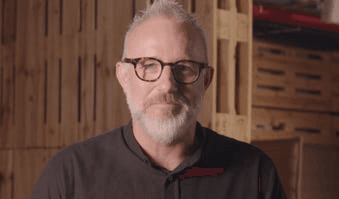
Learning a new language can open up a world of new opportunities
IE University considers multiple language acquisition to be a key element of its educational model, leading to success in both work and study.
The Language Center at IEU is proud to offer students the possibility to study a wide range of languages, including French, German, Portuguese, Chinese, Arabic, Spanish, and English. With such a large variety of options, our students are able to personalize their academic path to meet their future career plans and objectives.

The Language Center at IEU
The Language Center helps students develop their multilingual communicative skills to help them flourish in the international labor market.
INTERNATIONAL ACCREDITATION
IE Business School has been granted the prestigious “Triple Crown Accreditation” by the most highly respected business school accreditation associations. This honor is shared with a select few, with a mere 97 business schools worldwide (less than 1% of all business schools in the world) as of March 2020. The “Triple Crown Accreditation” certifies that the IE Business School's unique education model—based on innovative teaching methodologies and a commitment to breaking boundaries—is among the best in the world.
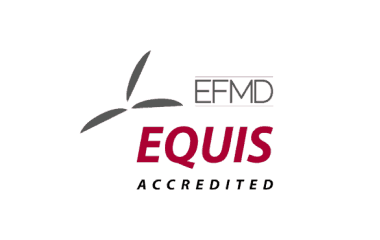
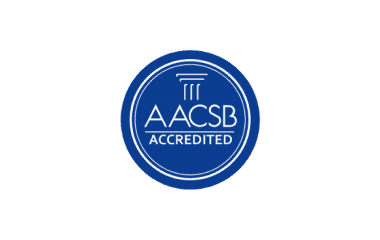

COMPETENCES
Basic competences
GENERAL COMPETENCES
- Understand the functions of communication in contemporary society.
- Develop group work competences by leading and cooperating in project management and as a team member.
- Apply and integrate knowledge acquired throughout the program.
PROGRAM-SPECIFIC COMPETENCES
- Understand the main theories and conceptual frameworks applicable to communication and the media, with a particular focus on the texts that make up the discipline’s analytical foundations.
- Closely analyze the context in which communication takes place, paying attention to its cultural, social, economic, political, technological and legal aspects.
- Understand the different functions of corporate communication and how they should align with companies’ and organizations’ strategies.
- Be familiar with the corporate dimension of communication and the media in terms of its structure, operation and management, as well as new business models and the implications of digitalization.
- Acquire the knowledge and competences necessary to undertake entrepreneurial communication projects and to work in a business environment.
- Develop the knowledge and competences necessary to plan and implement integrated communication strategies, establishing strategic synergy between communication, brand, advertising and marketing actions in a way that encompasses both offline and online media channels.
- Carry out strategic oral and written communication actions in line with communication’s different purposes, using persuasion techniques and generating engagement.
- Understand and manage the processes used to develop creative content for brands and the entertainment industry with the aim of rolling out and evaluating projects, developing brand and advertising content, and creating brand guidelines and templates.
- Create audiovisual content adapted to different formats and platforms with knowledge of the basic principles of image and sound development and production using photography, video, design and digital and mobile platforms, both in terms of the creative process and management.
- Use audiovisual language to narrate linear content or interactive multimedia content.
- Apply the main research methodologies used in different communication fields, including knowledge of quantitative and qualitative methods, audience analysis and market studies.
- Apply the main creative methodologies used as a part of innovation processes and the development of creative projects and products.
- Learn to mine and acquire qualitative and quantitative data to drive informed decision-making regarding a brand’s communication strategies.
TRANSVERSAL COMPETENCES
- Identify the main cultural identity traits that characterize today’s world by understanding the main contemporary ideological trends.
- Behave professionally in accordance with the core principles and ethics of the profession.
- Manage unforeseen situations by being able to adapt to organizational changes.
- Use knowledge of the discipline to analyze and evaluate current situations.
- Form a part of interdisciplinary and multicultural teams to achieve shared goals in a diverse environment.
- Work actively in an international context.
APPLICABLE REGULATIONS OF THE PROGRAM
Read our blog
Frequently Asked Questions
How long is a Bachelor of communication?
At IE University, the Bachelor in Communications and Digital Media takes 4 years to complete.
What are the subjects of BS media and communication?
Along the 4 years of the Bachelor you will study different subjects. Some are: communications foundations, writing for media, visual and digital media culture, consumer behavior, branded content, among others. You can see the complete study plan at: https://www.ie.edu/university/studies/academic-programs/bachelor-communication/the-program#content
Does media and communication require maths?
The Bachelor in Communications and Digital Media does not require a specific level of maths. Please check the admissions requirements for this program here .
Why is digital communication easier?
Communications can be a challenging and rewarding bachelor's degree, but whether it is considered "easy" or not will depend on the individual student and their strengths, interests, and goals.
What do you learn in digital media and communication?
The Bachelor in Communication and Digital Media aims to teach young ambitious individuals to build the proper skill set to become professionals capable of facing real-world challenges. Through our hands-on teaching methodology, students from the Bachelor in Communication and Digital Media will find a perfect balance between what is studied throughout their degree and the projects that are applied based on real-world scenarios.